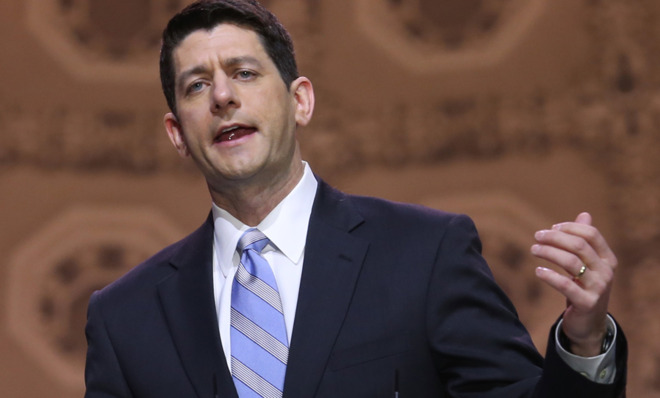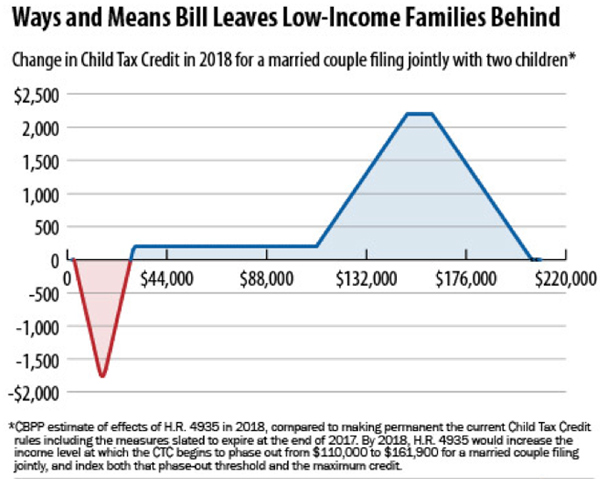Don't listen to Paul Ryan: The GOP is still the party of makers and takers
Ryan has disavowed his previous rhetoric. But the GOP's policy proposals haven't changed.


A free daily email with the biggest news stories of the day – and the best features from TheWeek.com
You are now subscribed
Your newsletter sign-up was successful
For years, Wisconsin Rep. Paul Ryan, the GOP's leading policy thinker, warned us of a coming "society where the net majority of Americans are takers, not makers." Government handouts were building a class of people who would be "dependent on the government for their livelihoods [rather] than themselves."
But he abruptly changed his tune in a Wall Street Journal op-ed last week, repudiating his own makers vs. takers rhetoric. "The phrase gave insult where none was intended," Ryan insisted. "People struggling and striving to get ahead — that's what our country is all about. On that journey, they're not 'takers'; they're trying to make something of themselves. We shouldn't disparage that."
Ryan explained that he used the phrase to illustrate a Tax Foundation study on government spending and taxation. "If a family's share of government spending exceeded the amount it paid in taxes, the study deemed them 'receivers.' If it was less, they were described as 'givers.'"
The Week
Escape your echo chamber. Get the facts behind the news, plus analysis from multiple perspectives.

Sign up for The Week's Free Newsletters
From our morning news briefing to a weekly Good News Newsletter, get the best of The Week delivered directly to your inbox.
From our morning news briefing to a weekly Good News Newsletter, get the best of The Week delivered directly to your inbox.
Rather than stick with the Tax Foundation's "giver"/"receiver" characterization, Ryan opted for a harsher dichotomy. Though he pleaded naïvete — "both seemed convenient shorthand for a serious problem" — "maker"/"taker" is a telling choice. Ryan amped up the rhetoric to imply righteous possession and wrongful theft, to denote virtuous productivity and leeching sloth.
Ryan has now retreated from this divisive articulation on the heels of his generally well-received anti-poverty proposals. He joins a growing conservative rush to break with the sour, anti-47 percent social Darwinism that has prevailed on the right throughout the Obama years.
But this break doesn't go much deeper than messaging. A close look at some of the key policy proposals from conservative reformers reveals that separating the supposed makers from the takers remains deeply embedded in their DNA.
Consider Utah Sen. Mike Lee's proposal for a larger child tax credit. The CTC is our main child subsidy, providing a $1,000 tax credit per child for qualifying families. Lee's plan would more than double it, to $2,500.
A free daily email with the biggest news stories of the day – and the best features from TheWeek.com
But Lee's plan provides the most relief for those who need it the least. It does away with a reform enacted under the 2009 stimulus that allowed families earning as little as $3,000 to claim part of the CTC while providing unlimited eligibility to high-income families. As the Center on Budget and Policy Priorities remarked, "Every child of a high-income banker or corporate executive would qualify [for Lee's CTC], but many children of cashiers, house cleaners, and health aides wouldn't."
Lee's plan is also not fully refundable for families who earn too little to incur much tax liability. Low-income families would get a CTC refund equal only to the extent of their payroll taxes, leaving behind families who earn too little to file federal income tax returns.
Republicans on the House Ways and Means Committee have approved similarly unbalanced legislation. Their bill, too, is a boon for the wealthy and a stinging loss for low-income families. It would exclude families earning under $14,500 from any CTC eligibility while expanding the credit to families earning $205,000.

This lopsided distribution isn't owing to scarce budgetary resources, either. Rather, it's a deliberate choice to favor the wealthy over the poor. As Elaine Maag of the Tax Policy Center explained, making the CTC refundable "would cost about as much as [the House] plan but would target assistance to the neediest workers rather than higher-income households."
Ryan's own proposals are a mixed bag. Though he laudably aims to expand the refundable earned income tax credit, he'd otherwise punt anti-poverty policy to the states through a bulk opportunity grant. Recent history suggests that devolving low-income programs to the states will have bad outcomes for the poor. Welfare reform has left only 25 percent of poor families receiving assistance from the states. And thanks to Republican-controlled states, ObamaCare's Medicaid expansion has left out 5.8 million eligible Americans.
When crafting policy, conservatives are still deeply reluctant to let the poor derive more benefits from our welfare state than they pay in taxes. They have long pilloried refundable tax credits as being redistributive handouts and welfare in disguise. This is why Lee makes his new CTC refundable against payroll taxes but won't go so far as to make it fully refundable for low-income families who have exhausted their tax liability.
This discomfort utterly deflates conservative anti-poverty efforts. If transfers that give needy Americans net subsidies are abhorrent, then conservatives leave no room for government to do anything but accept the market poverty rate that our economy produces — about 24 percent in 2014.
"People struggling and striving to get ahead — that's what our country is all about," Ryan proclaimed in his op-ed. The question for him and other conservatives is whether there's a place for government to give a leg up to those struggling and striving. If their policies fail to match their shift in rhetoric, then the era of you're-on-your-own conservatism will remain firmly in place.
Editor's note: A previous version of this article misstated the number of Americans left out of the Medicaid expansion. It has since been corrected. We regret the error.
Joel Dodge writes about politics, law, and domestic policy for The Week and at his blog. He is a member of the Boston University School of Law's class of 2014.
